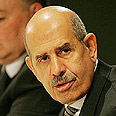
Speaking to the Newsweek magazine, ElBaradei said that instead of using unilateral force, Israel should have provided the nuclear watchdog with the intelligence it had.
"I have been very harsh on Israel because they violated the rules of international law on the use of unilateral force, and they did not provide us with the information before the bombing (with) which we could have established whether Syria was building a nuclear reactor," the IAEA chief said.
In a sarcastic remark directed at the United States, ElBaradei said that the US was also to blame for "sitting on the information" for a year and a half after the bombing.
"Now we are doing our best to try to see what Syria was doing, but it's like Iran. I cannot jump the gun and say Syria was building a nuclear facility because what we are doing now is trying to verify what was there," he added.
During the interview, which was held at the margins of the World Economic Forum in Davos, Switzerland, ElBaradei also referred to the Iranian nuclear program, noting that Japan was also advancing a nuclear technology like Tehran.
The interviewer reminded the IAEA chief that Japan was not threatening to destroy Israel. ElBaradei replied that there had been a lot of offensive statements made by Iran, but that as far as he understood, Iran was interested in a one-state solution rather than in seeing Israel wiped off the map.
Direct dialogue without preconditions
ElBaradei went on to say that the world was facing a problem because the Middle East had become more extreme and Iran was very popular in the Muslim world. We must bolster the moderates and find a solution, and Tehran could be a very positive element in finding such a solution, he added.
He said the nuclear issue covered a lot of security-related, diplomatic and economic issue, and that what was needed was a "major deal" like the one US President Barack Obama has been talking about.
"You're not going to have trust unless you have a direct dialogue. President Obama right now is saying he's ready to have a direct dialogue without preconditions, based on mutual respect. I say this is absolutely overdue," he said.
"You cannot treat Iran like a donkey, with carrots and sticks. This is a competition for power in the Middle East… It's a competition between Iran and the West … Iran wants to have its role as a regional security power recognized."
A report issued by nuclear monitors in Vienna last November determined that the building destroyed in an Israel Air Force strike in Syria had characteristics similar to those of a nuclear reactor. It also ruled that uranium had been found near the facility, which could have been used for enrichment.
The report stressed, however, that the findings were preliminary and that additional inspections should be held and Syrian documents should be probed before reaching clear conclusions.
A week after the report was released, ElBaradei told the Los Angeles Times that Damascus' request for help in building a nuclear power station did not constitute a threat, and that the West's efforts to hinder the project threatened to hurt the agency's reliability.
The nuclear watchdog chief added that it was too early to judge the Syrian plan, noting that the American claims on weapons of mass destruction in Iraq had turned out to be wrong.















